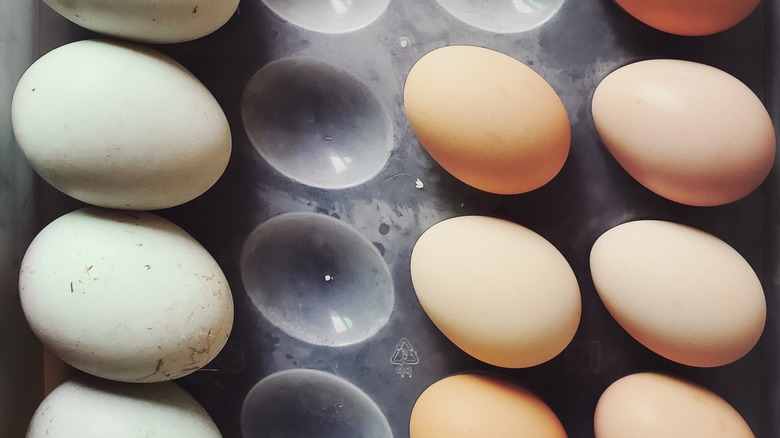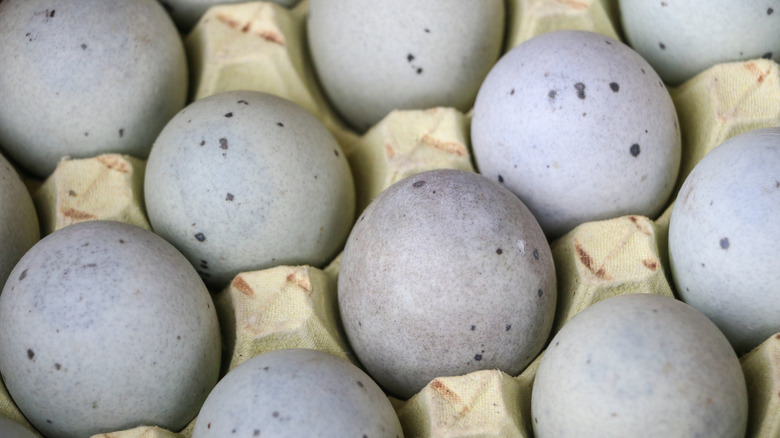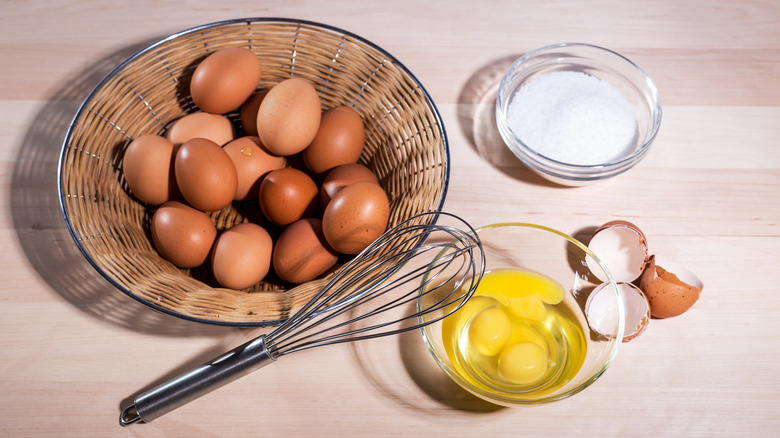Is There Really A Difference In Taste Between Duck And Chicken Eggs?
The more you cook, the more you understand that there can be a great deal of difference in nuance. A subtle tweak here, an extra pinch of salt there, and you've added another element to the dish, whether intentional or not. When it comes to chicken and duck eggs, the same holds true. It's not a case where eggs are eggs, and any difference is inconsequential in the big picture. Duck eggs offer a whole different experience than traditional chicken eggs.
Duck eggs taste noticeably different from chicken eggs, offering a richer, creamier flavor thanks to their higher fat content. Chicken eggs are mild and incredibly versatile, but duck eggs take things up a notch with their fuller, more luxurious flavor. Some describe the flavor of duck eggs as more intense, while others say it's simply eggier than chicken eggs. If you're looking for something different tastewise because you're tired of traditional eggs or you just want to experiment in the kitchen with a new recipe, duck eggs are worth trying. But, before you swap them into every dish, let's get into how these eggs differ anatomically and nutritionally — and where they truly work best in the kitchen.
The differences between duck and chicken eggs
The first thing you notice is the size. On average, duck eggs are bigger than chicken eggs, with some duck eggs getting up to twice the size of your typical chicken egg. They also have thicker shells, which makes them a bit tougher to crack, but this thickness also makes them more durable and less prone to accidental breakage. The shell's strength also means duck eggs have a longer shelf life when stored properly.
Additionally, the yolks are significantly larger and more vibrant, often leaning toward a deep orange hue compared to the pale yellow of chicken egg yolks. The whites in duck eggs are thicker and more viscous, which makes them stand out in baking. This density adds height and structure to cakes, soufflés, and meringues, so duck eggs are a favorite among bakers. However, this same thickness can make duck eggs feel a bit heavier in simpler preparations such as scrambled eggs, so they're not always a one-to-one substitute for chicken eggs in every recipe.
Lastly, duck eggs come in many more colors and variations than a standard chicken egg. Some are bright white, but others can have soft greys, light greens, warm browns, speckled patterns, and even a deep, almost black shade. It all depends on the duck breed, but the appearance doesn't affect the flavor.
Duck and chicken eggs' nutritional value and culinary uses
Nutritionally, duck eggs give you a lot of benefits. They're higher in fat and protein than chicken eggs, making them more calorie-dense and more filling. They're also rich in all eight B vitamins, iron, and selenium, which can boost energy levels, improve the appearance of your skin, and support immune health. If you're looking for a low-carb, high-protein option, duck eggs are a powerhouse.
When it comes to cooking, the richness of duck eggs is perfect in recipes such as custards, pastries, and creamy sauces. Their larger yolks make them ideal for recipes where a silky texture is key, such as velvety hollandaise or crème brûlée. On the flip side, chicken eggs are still the go-to for everyday meals including omelets, where their lighter flavor and texture work best. However, so as to not be remiss, it is worth noting that there are some in the camp that duck eggs make for better omelets. If you're baking a decadent cake or experimenting with savory dishes, knowing when to use duck eggs versus chicken eggs can elevate your culinary game. Both have their strengths, but if you're after bold flavor and richness, duck eggs are hard to beat.


